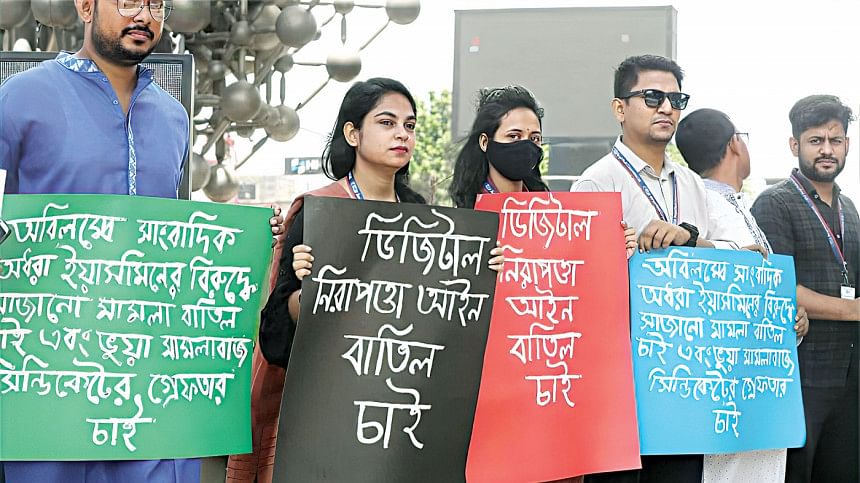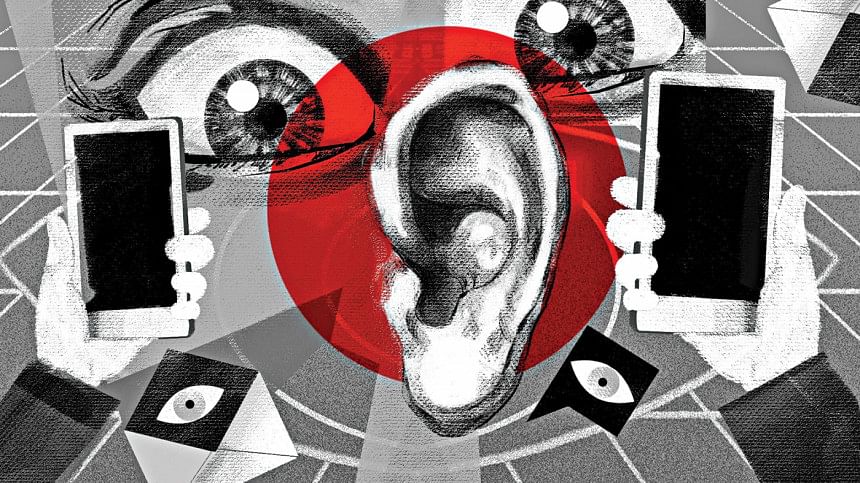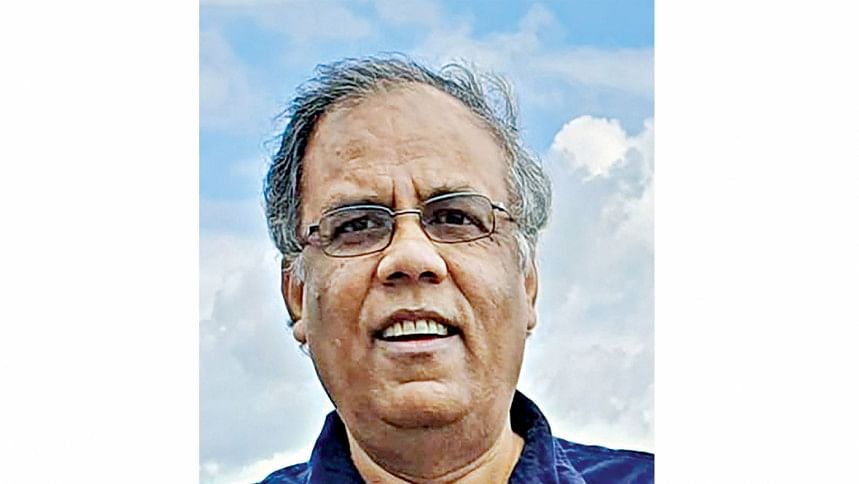Without the restoration of democracy press freedom remains unattainable

""Everyone has the right to freedom of opinion and expression; this right includes freedom to hold opinions without interference and to seek, receive and impart information and ideas through any media and regardless of frontiers."- This is what article 19 of the Universal Human Rights Declaration promised 75 years ago. As a signatory to this declaration, Bangladesh is duty-bound to uphold these rights for all its citizens. At the heart of this commitment lies the crucial role of journalists and media outlets, entrusted with the responsibility of delivering fact-based, unbiased information. Nevertheless, within the current political environment and economic realities, the cherished ideal of press freedom appears increasingly elusive.
Even more disheartening is the unprecedented level of assault on journalism worldwide. Governments, large corporations, tech giants, transnational criminal syndicates, and various interest groups are all intimidated by revelations, fiercely striving to conceal them from public scrutiny and resorting to every conceivable method to target the media.
Statistics may vary, but 2023 was the deadliest year ever for journalists. During the last 100 days of the year, the ongoing systematic destruction of Gaza and indiscriminate killing of Palestinians by occupying Israeli forces saw, on average, more than one journalist lose their lives each day. Due to varying counting methods, the International Federation of Journalists (IFJ) toll stood at 120, while the Geneva-based Press Emblem Campaign (PEC) put the figure at 140.

According to the rights group, Committee to Protect Journalists (CPJ), no other war has taken so many journalists' lives in such a short period. PEC also states that the Israeli army has systematically destroyed the Palestinian media in Gaza by bombing their offices and facilities.
This distressing toll in Gaza comes on top of the worldwide worsening media environment which is consequential to the gradual weakening of democracies and the rise of authoritarianism. Collating data from the Observatory of Killed Journalists of UNESCO the PEC reports that outside the Gaza Strip, 59 journalists have been killed in 27 countries with Mexico standing second in the list of most journalists killed with a total of 9 deaths recorded. Bangladesh is also on the list with two victims. According to them, 547 journalists spent New Year's Eve in jail worldwide.
In Bangladesh, a national rights group called Ain-o-Salish Kendra in its annual review noted that 290 journalists were subjected to assault, intimidation, and harassment last year. Undoubtedly, assaults on the media surged with heightened intensity in the run-up to the national election, and the year 2023 was no exception. Rather it is part of a disturbing trend developed throughout the AL government's shift towards authoritarianism since it succeeded in holding a one-sided election in 2013. Since then, physical attacks on journalists causing deaths have risen sharply taking the tally to 16 in a decade, mostly victims of violence by the activists of the Awami League. Attacks causing physical harm remain high as impunity for the perpetrators has become the norm. A glaring example of the failure to bring the perpetrators to justice is the case of the double murders of Sagar Sarwar and Meherun Runi, a well-known journalist couple. A court has allowed the investigating agency more than 100 times of extensions to complete its probe.
In Bangladesh, a national rights group called Ain-o-Salish Kendra in its annual review noted that 290 journalists were subjected to assault, intimidation, and harassment last year. Undoubtedly, assaults on the media surged with heightened intensity in the run-up to the national election, and the year 2023 was no exception.
Furthermore, several journalists have been forcibly disappeared and later sued on spurious charges after their eventual release. Some have also had to flee the country. A study by the Centre for Governance Studies (SGS) found that journalists were the second most victimized professional group, subjected to abuse by the dreaded Digital Security Act (DSA) which eventually was replaced last year. Bangladesh slipped eleven places in the World Press Freedom Index between 2021 and 2023, leaving it at 163rd place – the lowest rank in South Asia.
This grim glimpse of the state of press freedom is not an aberration, but rather commensurate with the rapid backsliding of democracy in the country. More than a decade-long suppression of dissent and crackdown on the potentially challenging force, the Bangladesh Nationalist Party, (BNP) and capturing major state institutions have transformed the country from a multi-party democracy to a virtual one-party state. Two leading research organizations engaged in global monitoring of democracy and freedom; the V-Dem Institute of Sweden and Freedom House of the United States have been consistently flagging these backsliding in democratic practices and personal freedoms both offline and online ranging from freely expressing opinions to political, civil and cultural rights. The V-Dem Institute's Democracy Report 2023 puts Bangladesh in the group of countries that are in the process of autocratizing and Freedom House classified us as a country partly free.

National and international rights groups have long been documenting incidents of curtailing civic rights including freedom of association, organizing protests, and expressing opinions and thoughts freely which the authorities do not approve of. These restrictions also extend to shutting down the internet or frequent slowing down of mobile connectivity during anti-government protests. A New York-based non-profit organization working on the digital rights of people globally, Access Now reported in 2022 that Bangladesh was one of the top five countries of internet shutdowns. It observes that governments wield Internet shutdowns as weapons of control and shields of impunity.
Paradoxically, the last 15 years have witnessed a proliferation of news outlets in the country with over 50 licenses for television channels, dozens for radio stations, and hundreds for newspapers and online news portals. However, this growth is tainted by a lack of independence, as media ownership is often entwined with party allegiance. A survey by the Centre for Governance Studies found most outlets supportive of the government are owned by businesses using their media ownership as a means of furthering other commercial interests.
These outlets largely survive on state patronage in various forms or subsidies from their owners, who consider them an investment for furthering other interests including political ambitions. About a dozen owners of media companies participate in the just concluded parliamentary elections and their outlets' reporting was markedly different from others, either by disproportionate coverage of or apparent bias towards respective owners. Government ministers and leaders of the ruling party, however, have consistently argued that media plurality is proof of media freedom in Bangladesh. In reality, most of these outlets thrive on state patronage, shaping a media landscape heavily influenced by the ruling party and stifling independent voices.
The recent questionable election outcome is poised to further consolidate unchecked power, tightening the government's control over the media. It was common knowledge that editors/producers of television talk shows are used to getting frequent advisories on who can and cannot be invited. Private business houses were advised not to place advertisements in newspapers critical of the government. However, these practices are unlikely to end soon. The newly appointed State Minister for Information and Broadcasting, Mohammad Ali Arafat has already warned that the government was planning to establish a framework to ensure accountability for spreading what it determines 'disinformation and rumors', though recent scrutinies by several fact-checking groups have identified pro-government groups as the most sources of generating and spreading disinformation.
The controversial Cyber Security Bill, and criticized for its restrictiveness, heightens fears of additional encroachments on freedom of expression. Concerns have been expressed at the fourth Universal Periodic Review (UPR) at the United Nations Human Rights Council over the potential abuse of the CSA and at least two countries - Canada and Belgium - have called for repealing it. Additionally, the proposed Regulation for Digital, Social Media, and OTT Platforms raises concerns about replicating the restrictive nature of the abolished DSA, exacerbating worries over media freedom.
Indeed, the citizens' empowerment provided by technological advancement and global open platforms like Facebook, X (formerly Twitter), TikTok, Instagram, and many others have also derived increased risks of harm to vulnerable groups by the spread of misinformation, fake news, and cybercrime. While governments worldwide grapple with these challenges posed by the digital age, there is a pressing need for a balanced approach that protects vulnerable groups without compromising freedom of expression. Initiatives like the Online Safety Bill in the United Kingdom and the European Media Freedom Act in the European Union serve as examples of this balanced approach.
The Online Safety Bill in the United Kingdom contains safeguards for news publisher content and wider journalistic content when it is shared on social media platforms. The European Union is also in the process of enacting the European Media Freedom Act aimed at 'better protect editorial independence, media pluralism, ensure transparency and fairness and bring better cooperation of media authorities through a new European media Board.' The EU Commission says that the act includes unprecedented safeguards for journalists to perform their jobs freely and safely.
As the financial landscape of journalism transforms, the concept of journalism as a public good gains traction. UNESCO suggests three urgent measures to safeguard journalism: public financing for trustworthy news outlets, enhanced support for genuine public service media, and increased donor aid and philanthropic investments in news production.
In Bangladesh, however, these issues can only be adequately addressed within a democratic framework, which is absent at present. The tainted renewal of the Awami League regime further distances the dream of a free press, emphasizing the urgent need for the restoration of democracy.

 For all latest news, follow The Daily Star's Google News channel.
For all latest news, follow The Daily Star's Google News channel. 



Comments